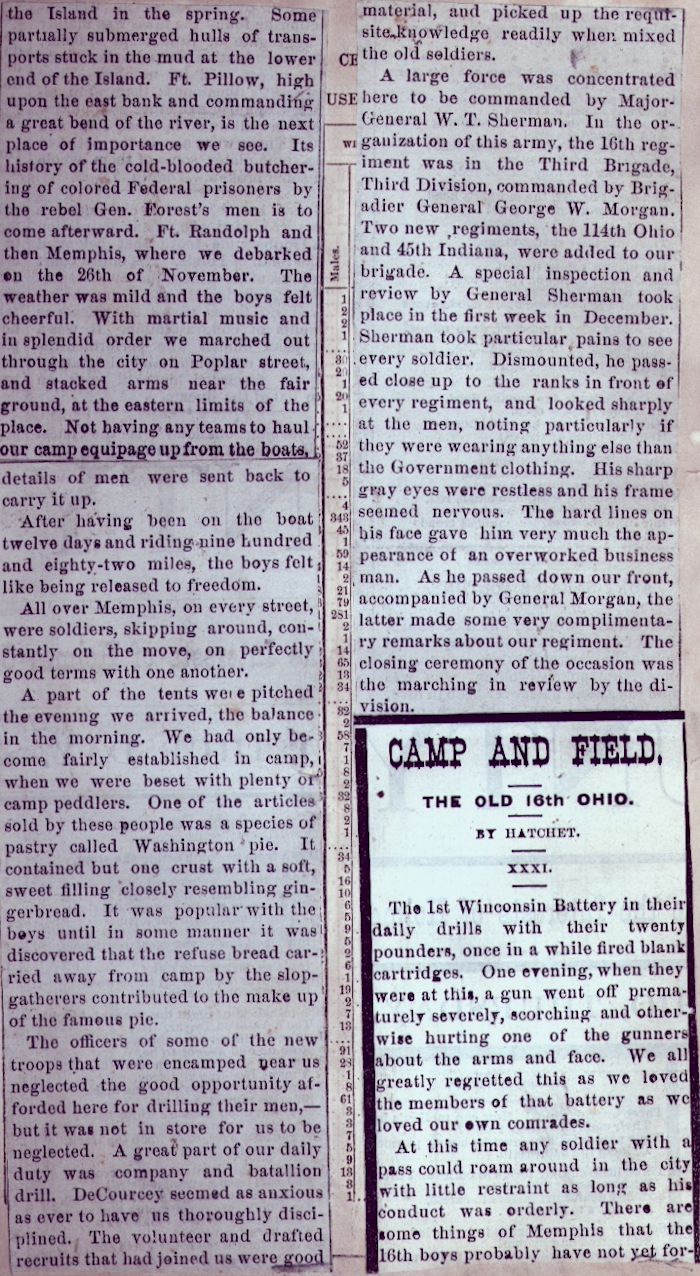| Camp & Field Page 48 | Camp & Field Index Page | 16th OVI Home Page | Camp & Field Page 50 |
The Camp & FieldArticles by Theodore Wolbach |
 Cpl. Theodore D. Wolbach |
The following image is taken from a book titled "Mortality and Statistics of the Census of 1850" in which it is believed retired Captain Rezin H. Vorhes, Company H, pasted over the pages a series of articles written by Cpl. Theodore D. Wolbach, Company E, titled "Camp and Field" and published, by chapter, in the Holmes County (Ohio) Republican newspaper from February 24, 1881 to August 17, 1882. The articles tell the story, in great detail and color, of the 16th OVI, from the inception of the 3-year regiment in October, 1861, through all its camps, battles and marches until it was disbanded on October 31, 1864. The articles pasted in the Vorhes book cover the first 35 chapters, published through October 20, 1881. All the remaining chapters were recently found in a Holmes County library by researcher Rob Garber who obtained copies, performed the transcriptions and provided to this website and which are also presented here, thus providing the complete work by Theodore Wolbach.
Throughout these articles click on the underlined white text for additional details.
The webauthor thanks 16th Ohio descendant Rob Garber for his excellent research on the Camp And Field articles and for performing the tedious digital transcription of those articles found on each page. The transcriptions were made to reflect the original articles verbatim, misspellings and all. Rob is the 3rd great nephew of Capt. William Buchanan, Company F, 16th Ohio, who served in the 90-day regiment as a private, re-enlisting in the three year regiment, and eventually making the rank of Captain of Company F. Thanks Rob!
Page 49 - Chapter 30, 31 - November, 1862
 |
the Island in the spring. Some partially submerged hulls of transports stuck in the mud at the lower end of the Island. Ft. Pillow, high upon the east bank and commanding a great bend of the river, is the next place of importance we see. Its history of the cold-blooded butchering of colored Federal prisoners by the rebel Gen. Forest's [sic] men is to come afterward. Ft. Randolph and then Memphis, where we debarked on the 26th of November. The weather was mild and the boys felt cheerful. With martial music and in splendid order we marched out through the city on Poplar street, and stacked arms near the fair ground, at the eastern limits of the place. Not having any teams to haul our camp equipage up from the boats, details of men were sent back to carry it up. After having been on the boat twelve days and riding nine hundred and eighty-two miles, the boys felt like being released to freedom. All over Memphis, on every street, were soldiers, skipping around, constantly on the move, on perfectly good terms with one another. A part of the tents were pitched the evening we arrived, the balance in the morning. We had only become fairly established in camp, when we were beset with plenty of camp peddlers. One of the articles sold by these people was a species of pastry called Washington pie. It contained but one crust with a soft, sweet filling closely resembling gingerbread. It was popular with the boys until in some manner it was discovered that the refuse bread carried away from camp by the slop-gatherers contributed to the make up of the famous pie. The officers of some of the new troops that were encamped near us neglected the good opportunity afforded here for drilling their men,--but it was not in store for us to be neglected. DeCourcey seemed as anxious as ever to have us thoroughly disciplined. The volunteer and drafted recruits that had joined us were good |
material, and picked up the requisite knowledge readily when mixed [with] the old soldiers. A large force was concentrated here to be commanded by Major-General W.T. Sherman. In the organization of this army, the 16th regiment was in the Third Brigade, Third Division, commanded by Brigadier General George W. Morgan. Two new regiments, the 114th Ohio and 45th Indiana, were added to our brigade. A special inspection and review by General Sherman took place in the first week in December. Sherman took particular pains to see every soldier. Dismounted, he passed up close to the ranks in front of every regiment, and looked sharply at the men, noting particularly if they were wearing anything else than the Government clothing. His sharp gray eyes were restless and his frame seemed nervous. The hard lines on his face gave him very much the appearance of an overworked business man. As he passed down our front, accompanied by General Morgan, the latter made some very complimentary remarks about our regiment. The closing ceremony of the occasion was the marching in review by the division. Published in Holmes County Republican XXXI. The 1st Winconsin [sic] Battery in their daily drills with their twenty pounders, once in a while fired blank cartridges. One evening, when they were at this, a gun went off prematurely severely, scorching and otherwise hurting one of the gunners about the arms and face. We all greatly regretted this as we loved the members of that battery as we loved our own comrades. At this time any soldier with a pass could roam around in the city with little restraint as long as his conduct was orderly. There are some things of Memphis that the 16th boys probably have not yet for- |
| Camp & Field Page 48 | Camp & Field Index Page | 16th OVI Home Page | Camp & Field Page 50 |